
by Alison Hawkins
“Go outside” ‘they’ said. “It’s healthier”. Accordingly, we moved outdoors in August and have remained there every day, playing and learning and avoiding germs.
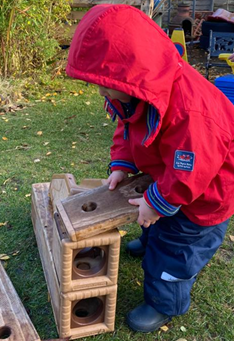 I recently declared this in a twitter feed, and illustrated the statement with four pictures – of happy, engaged children. Some people may consider moving outdoors a sensible move, others might wonder why taking that action should be deemed remarkable.
I recently declared this in a twitter feed, and illustrated the statement with four pictures – of happy, engaged children. Some people may consider moving outdoors a sensible move, others might wonder why taking that action should be deemed remarkable.
To explain our change of emphasis, one must return to the uncertainty and anxiety of the COVID-19 lockdown, and the trauma of ‘delivering’ a child-led, mostly outdoor kindergarten, online through the use of mobile phones and a PC, for the duration of the summer term. There was also the real fear of the future, the potential of which changed on a daily basis as restrictions, guidance and bubbles were bandied about. In the end, to retain my sanity, July and early August were spent painting ‘outdoor furniture‘ a tranquil sage green, and our garden areas were revamped to provide many spaces.
Out and about
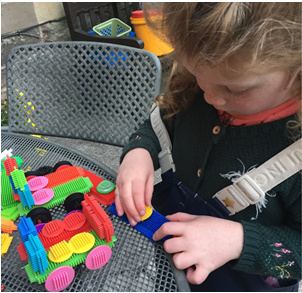 These learning and playing spaces ranged from open grassed areas for running and playing with balls and hoops, to quiet, intimate sheltered spots for reading and contemplating, to play houses, patios, water-tray units, large sand pit, construction spot for building with large blocks and ‘loose parts’, and nooks and crannies to hide in or crawl through. A large art easel was made from a pallet, tables and chairs were set out and – horror of horrors – wooden toys were left inside, temporarily languishing on redundant bookshelves to be replaced by long forgotten plastic playthings (playthings which were eminently washable).
These learning and playing spaces ranged from open grassed areas for running and playing with balls and hoops, to quiet, intimate sheltered spots for reading and contemplating, to play houses, patios, water-tray units, large sand pit, construction spot for building with large blocks and ‘loose parts’, and nooks and crannies to hide in or crawl through. A large art easel was made from a pallet, tables and chairs were set out and – horror of horrors – wooden toys were left inside, temporarily languishing on redundant bookshelves to be replaced by long forgotten plastic playthings (playthings which were eminently washable).
We were ready to welcome our young charges back to the ‘new normal’ and it amazed us how quickly fresh routines were established. Returning, and indeed new, children accepted saying cheerio to parents and carers at our ‘double gate’, embraced hand sanitising and got stuck into play. We are fortunate that, not only do we have extensive grounds, but we also have communal land less than a five-minute walk away, plus a cycle-cum-walkway right behind our property.
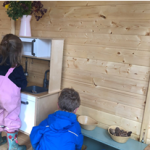 So far so good – staff could easily social distance, and everything that had been on offer inside was again available – but outdoors. Parents were happy, staff relaxed as we learned ‘this’ could work, and children thrived. We erected outdoor handwashing facilities and built an outdoor classroom named – by vote – The Cottage.
So far so good – staff could easily social distance, and everything that had been on offer inside was again available – but outdoors. Parents were happy, staff relaxed as we learned ‘this’ could work, and children thrived. We erected outdoor handwashing facilities and built an outdoor classroom named – by vote – The Cottage.
The difference between sometimes and all day
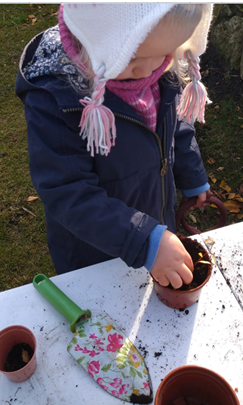 SO – what was different? After all, regulating bodies, and countless visitors, have over the years raved about our outdoor facilities. We have always made the most of them, and were proud of what we offered. We were an ‘almost totally outdoor’ nursery.
SO – what was different? After all, regulating bodies, and countless visitors, have over the years raved about our outdoor facilities. We have always made the most of them, and were proud of what we offered. We were an ‘almost totally outdoor’ nursery.
Except we now know we were not!
Perhaps the main ethos of our kindergarten is the emphasis we place on day to day living – the ‘being’- in our lives. I point out to parents that we do not exist for preparation for the future (though our practice inevitably leads to that) but we are here to simply ‘be’. Previously – ie before COVID – we would claim to spend more time out than in and I would mentally tick off the attributes of this learning outdoors. Since we don’t place huge importance on planning – preferring to follow the lead of the children – we are accustomed to seeing children playing and engaged in their play.
Recent documents such as My World Outdoors, and writers and theorists such as Bruce, Solly and Tovey have supported, through their books, greater understanding of the benefits of living in nature, and there is ample medical evidence to show the physical advantages of fresh air and exercise. It’s also thought that viruses spread far less easily outdoors.
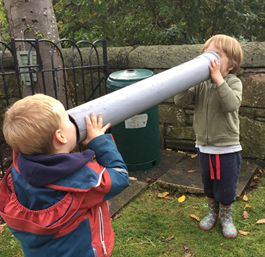 Nonetheless – delightedly – I am astonished at how things have developed; astounded at how, quite simply, children are finding themselves, and have discarded the toys we so carefully put out to ‘compensate’ for not being indoors, in favour of their own found ‘loose parts’ or symbolic play. The already customary involvement of children in their play has deepened, appears more meaningful and is sustained for longer. Their imaginations seem to have expanded, and their creativity – both in oral and in artistic ways – has soared.
Nonetheless – delightedly – I am astonished at how things have developed; astounded at how, quite simply, children are finding themselves, and have discarded the toys we so carefully put out to ‘compensate’ for not being indoors, in favour of their own found ‘loose parts’ or symbolic play. The already customary involvement of children in their play has deepened, appears more meaningful and is sustained for longer. Their imaginations seem to have expanded, and their creativity – both in oral and in artistic ways – has soared.
‘Being Me’ – outdoors!
For example, although the children were now, because of COVID restrictions, denied the independence of serving themselves from communal plates at snack and lunchtime, their independence and sense of responsibility in maintaining their environment has increased.  The sweeping of chalets and shelters, the tending of late crops, the planting of bulbs and the raking of leaves gives sense to the rhythm of the weeks and seasons. Story-telling around our campfire cements our sense of identity, and yarns, and shared information based on first hand experiences, give not only enjoyment but support emergent literacy.
The sweeping of chalets and shelters, the tending of late crops, the planting of bulbs and the raking of leaves gives sense to the rhythm of the weeks and seasons. Story-telling around our campfire cements our sense of identity, and yarns, and shared information based on first hand experiences, give not only enjoyment but support emergent literacy.
Each day small groups venture out and seem at one with the familiar environs within our neighbourhood. ‘Treespot’ where we identify birds and trees, and can climb and swing at will; ‘The Troll Bridge’ where we play Pooh Sticks or watch the ducks, and, occasionally, the heron; ‘The Bobble Bridge’ where balancing exercises many muscles, are all part of us as we, increasingly, feel part of nature.
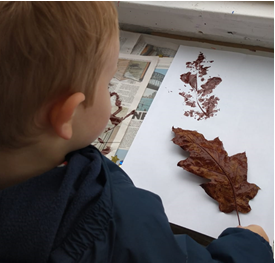 “Do the children not get cold?” we’re asked; “Are they missing out on learning?” “Is there enough for them to do?”
“Do the children not get cold?” we’re asked; “Are they missing out on learning?” “Is there enough for them to do?”
Froebel said “Outdoor life, life in Nature, is pre-eminently important for the young human being, for its effects are developing, strengthening, elevating, and enabling.” (Education of Man 1885, page 233).
What about the Scottish weather?
Our children are not cold – we insist on waterproofs as standard daily wear, and increasingly on hats and gloves. They are more likely to feel hemmed in if forced by a combination of wind and rain to seek shelter; they rarely manage more than twenty minutes in The Cottage or art room (an old conservatory), before they venture back to their preferred environment.
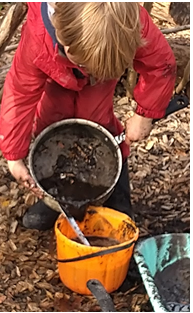 Far from missing out on learning they are experiencing bonus time and deep engagement (think Leuven Scale 5) – outstripping that of their older siblings and friends, very good though that may have been. There is so much choice for them to make that instinctively they use the seven principles of curriculum design – without ever needing to comprehend them. Boredom is unknown. Some would prefer to come on Saturday and Sunday also!
Far from missing out on learning they are experiencing bonus time and deep engagement (think Leuven Scale 5) – outstripping that of their older siblings and friends, very good though that may have been. There is so much choice for them to make that instinctively they use the seven principles of curriculum design – without ever needing to comprehend them. Boredom is unknown. Some would prefer to come on Saturday and Sunday also!
“Go outside” ‘they’ said – and we did, and have not looked back.
Alison J Hawkins is the Head of Wester Coates Nursery School, Edinburgh. She has ‘lived with her charges’ over many decades, and is a published author of a number of Early Years related articles.

